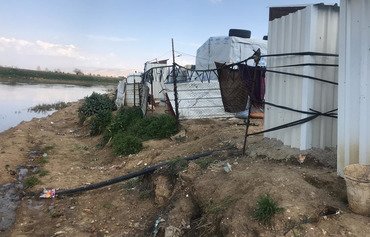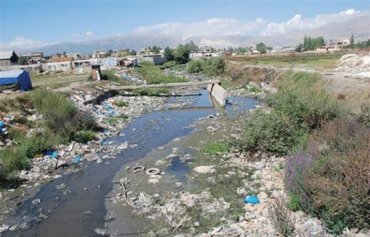Lebanon is the second largest host of Syrian refugees, with more than one million refugees living in 2,125 communities in urban and rural areas, according to a 2017 study by the UNHCR, UNICEF and the World Food Programme.
According to the Vulnerability Assessment of Syrian Refugees in Lebanon, there are about 1,700 informal camps where Syrian refugees reside that have environmental, health, housing and social repercussions on both refugees and host communities.
These informal settlements, many of which are set up on agricultural land in the Bekaa Valley and northern Lebanon, can damage agriculture, and typically lack sewage systems and the basic requirements for adequate housing, experts said.
Regulating this unfettered spread and random set up of camps has become an urgent need for the refugees and their host communities, they said, despite the great difficulties involved.
Lack of an urban policy
"The reason for the spread of so many informal camps is the lack of a national urban policy in Lebanon," Howayda al-Harithy, professor of architecture and urban design at the American University of Beirut told Al-Mashareq.
The lack of a national urban policy precluded any effort to develop these informal camps or any housing plan for low-income Lebanese citizens, she said.
"If Lebanon had an urban policy to solve the housing problem for low-income citizens, that would have helped provide housing for both Lebanese citizens and Syrian refugees," she said.
"The biggest problem lies in the camps set up on agricultural land, whose owners wanted to profit from rents," al-Harithy said.
This generates more income for them than agriculture, she explained, because of the decline in agricultural production and rise in rent, due to the high demand for housing.
The camps were built on arable land and are not connected to sewage networks, which is a basic requirement for adequate housing, she said, noting that this has an adverse impact on groundwater and surface water resources.
To alleviate these problems and prevent them from compounding, there needs to be a multi-level cross-ministry administrative body to address these issues, al-Harithy said.
This would comprise experts from all ministries concerned with housing and refugees, and would serve as an authority on the construction of housing that meets environmental, social, humanitarian and health requirements, she said.
Governance is necessary in this context, she stressed, rather than separate efforts through which each sector tries to solve the problem alone.
To tackle the problem of informal camps that are hard to regulate based on the required environmental and housing standards, al-Harithy said "the responsibility for finding a quick solution lies with the municipalities".
Municipalities must be granted broader powers to act, therefore, and given financial support to carry out the work, she added, which would give them the ability to ensure housing meets the required standards.
Need for a clear plan
"The deep political divisions between the Lebanese factions with regard to the Syrian situation has led to a lack of agreement on a clear plan for dealing with the refugees," said urban planning and organisation consultant Serge Yaziji.
"It is better to gather the refugees in specific areas that provide them with basic services, because their dispersal in informal camps precluded them from receiving these services, and caused damage to the environment and public health," he told Al-Mashareq.
Informal camps also put pressure on water and sewage networks, he added.
Yaziji stressed the need for the government to develop a "plan for the temporary relocation of refugees" that looks at ways to manage and finance this relocation.
Co-ordination is ongoing between relevant official departments and municipalities, he said, noting that municipalities are trying to tackle the issue of informal camps and their lack of social, economic and developmental services.
Lebanon's decision to not build official camps for Syrian refugees "has led to the spread of camps set up by individuals", UNHCR public information officer Lisa Abu Khaled told Al-Mashareq.
This has had the consequence of limiting the work that can be done to set up camps with adequate housing conditions, she said.
"UNHCR, in co-operation with the host municipalities, is working as much as possible to prevent the environmental damage caused by informal camps from getting worse," she said.

![An informal Syrian refugee camp has been established near a river in the Bekaa Valley of eastern Lebanon. [Junaid Salman/Al-Mashareq]](/cnmi_am/images/2018/11/12/15281-Lebanon-informal-camp-600_384.jpg)






